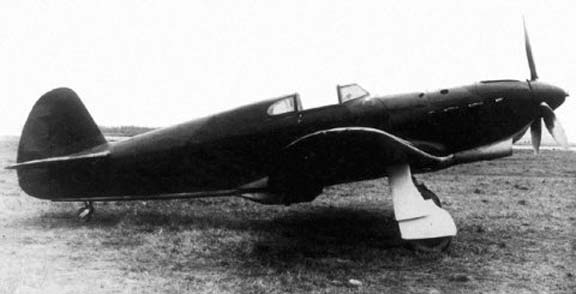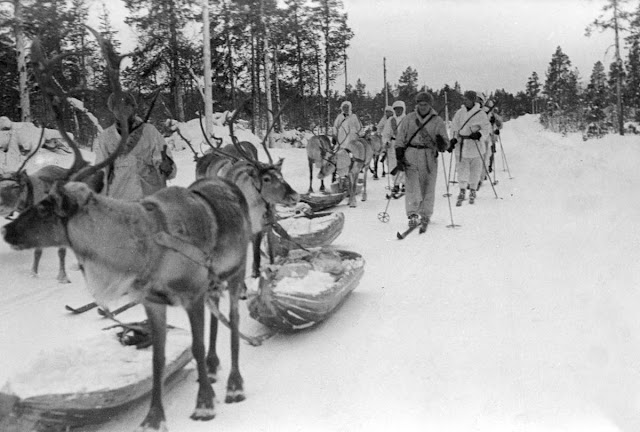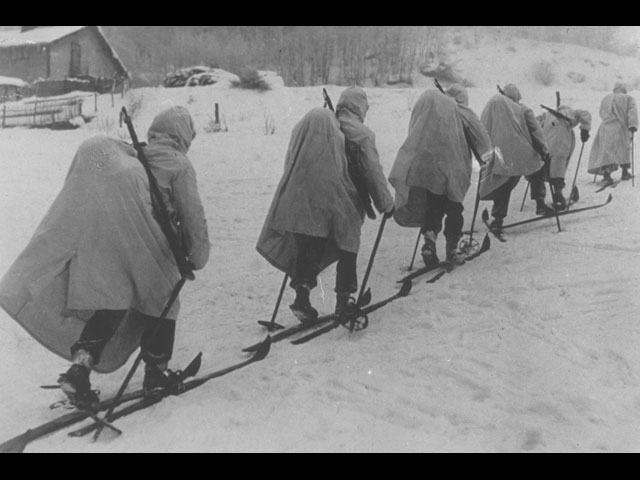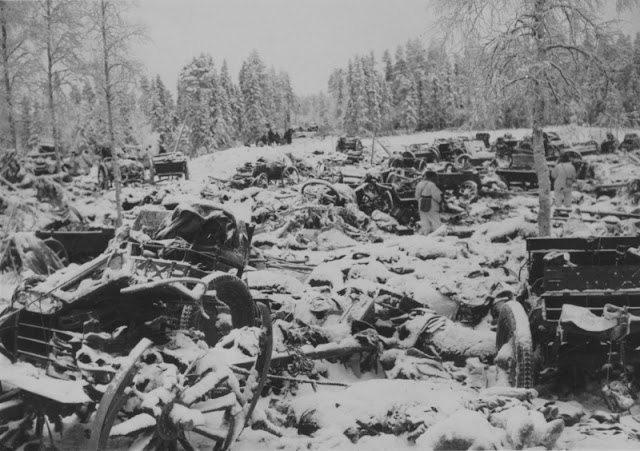Saturday 13 January 1940
 |
| Soviet submarine ShCh-324. |
The Germans in fact have been considering moving the attack date forward from the 17th, as contemplated in the lost plans, to the 14th. This is because that would give the Allies less time to shift their own forces to meet the attack. However, somewhat perversely, because the Belgians have temporarily convinced the German high command that they did not have the plans, the issue is not a priority. Before talking to Hitler, General Jodl postpones the date tentatively to the 15th or 16th, depending on further news. When everybody sits down to hash it out, Hitler ultimately intervenes and definitively postpones the attack until 20 January, supposedly due to the weather. By now, though, in light of the frantic Allied military moves, it should be clear that the Allies know all about the plan.
Winter War Army Operations: At Sallaa, the Soviet 9th Army orders the 122nd Division to retreat to the Märkäjärvi village. This helps the two prongs of the Soviet effort, on the north and south forks of the road, to form a tighter overall perimeter.
Winter War Air Operations: The Soviets bomb Helsinki, Turku, and nearby towns.
Winter War Naval Operations: Soviet submarine ShCh-324 surfaces within a convoy in the Sea of Åland, then it fires a torpedo, and misses. Finnish naval escort Aura II, which previously had been the Presidential yacht, damages ShCh-324 with depth charges. However, one of the depth charges explodes on the ship, utterly destroying it. There are 15 survivors and 26 perish. ShCh-324 escapes.
Western Front: There is artillery fire west of the Vosges Forest and east of the Moselle.
European Air Operations: The RAF conducts extensive surveillance over the Reich. It also drops propaganda leaflets over Vienna and Prague.
The RAF shoots down a Heinkel He 111 over the Firth of Forth.
The first flight of the Yakovlev Yak-1. It suffers from oil overheating issues.
Battle of the Atlantic: At 04:20, U-20 (Oberleutnant zur See Karl-Heinz Moehle) torpedoes and sinks 1,524-ton Swedish freighter Sylvia northeast of Aberdeen. All 20 crew perish, only one body is recovered on a raft.
The British at Gibraltar detain the US freighter Narbo. They release US freighter Tripp, though not with all her cargo.
Convoy OA 72 departs from Southend, OB 72M departs from Liverpool, and HG 15F departs from Gibraltar.
British Military: General Wavell's Middle East Command takes charge of East Africa.
French/Spanish Relations: The two nations sign a trade agreement, whereby Spain receives wheat, fertilizers, and manufactured goods and France receives iron, ore, and various minerals.
Norway: The new defense budget raises the overall government budget to the highest in history.
German Homefront: So many men are now employed in the Wehrmacht that the male industrial workforce is falling. NSDAP party leaders bruit about encouraging women to work outside the home, which is against Hitler's convictions.
Holocaust: Hans Frank issues new labor laws for Jews in occupied Poland.
 |
| Yakovlev Yak-1. |
January 1940
January 1, 1940: Finns Carve up the SovietsJanuary 2, 1940: Finnish Counterattacks Continue
January 3, 1940: Soviets Trapped
January 4, 1940: Soviet Breakout Attempts Fail
January 5, 1940: Dicing Up the Soviets
January 6, 1940: Soviet 44th Division Runs
January 7, 1940: Shakeup in Soviet High Command
January 8, 1940: Ratte Road Battle Ends
January 9, 1940: British Submarines in Peril
January 10, 1940: Mechelen Incident
January 11, 1940: Finns Surround More Soviets
January 12, 1940: New Soviet Attacks at Taipale
January 13, 1940: Fall Gelb Postponed
January 14, 1940: Japan's Government Falls
January 15, 1940: Soviets Prepare More Carefully
January 16, 1940: German Atrocities Uncovered
January 17, 1940: Bletchley Park in Action
January 18, 1940: New Hope for Allied Shipping
January 19, 1940: Finnish Attacks at Salla
January 20, 1940: Churchill Urges Cooperation
January 21, 1940: Asam Maru Incident
January 22, 1940: Dissension Within British Government
January 23, 1940: Dissension in South Africa
January 24, 1940: NKVD Blocking Detachments
January 25, 1940: Auschwitz Site Selected
January 26, 1940: Millionaire Bunker Destroyed
January 27, 1940: U-20 Sinks Four Ships
January 28, 1940: Softening Up the Finns
January 29, 1940: Moscow Willing to Talk
January 30, 1940: Hitler Throws Down the Gauntlet
January 31, 1940: Timoshenko Is Ready
2019









